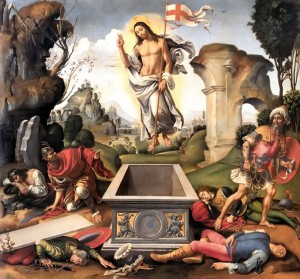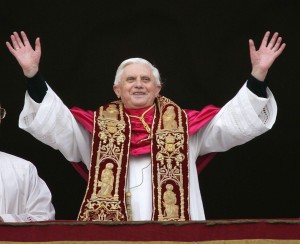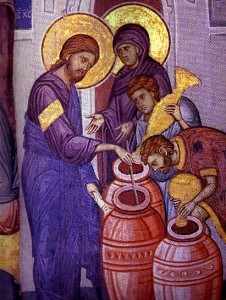There have been about a half a gazillion (no you’re right, probably more) posts made since Pope Francis was elected to the Seat of Peter. I want desperately to love this man, and there are many many reasons to do so. His genuineness, his affability, his deep love for the poor, his orthodoxy, his deep reverence for the Eucharist – all of these things are readily obvious right on the surface of this man. Though I do not recall him first-hand, I’m told he reminds many of Pope John Paul I particularly in how he smiles so frequently (ironic given the rather spurious stories passed around about him that some thought he never smiled).
There is just one thing that keeps sticking for me though. Every time I watch him at Mass or any liturgical function he opts for the lowest denominator in dress. Yes, I’m really that shallow, but we’ll get there in a minute – you can put the stick down for now. You see I live in a world almost bereft of beauty. Aside from my wife and my children – who are, without a doubt, jewels of the finest grade – so much of the rest of my life is dull compounded upon dreary tied together with plain. As a software engineer I live in a world of zeros and ones – even as a performance engineer my days are surrounded by numbers, facts, statistics, algorithms and data structures, all of which have the beauty and elegance of a clod of dirt. Beauty simply does not enter into the daily equation.
Similarly I haven’t the slightest hint of artistic abilities – I can’t paint, draw, sketch, sing or play an instrument (okay so I can make a few notes on a trumpet but that’s the extent of it). My wife can make crafts of dazzling beauty and does so almost without a thought, but me, yeah, I can draw a straight line if the ruler is taped to the page. Beauty, being one of the Transcendentals, is something for which we as humans were made by God to long for, along with Truth and Goodness. The latter two I can pull off on my own in studies and attempting to do good works as inspired by the Lord but Beauty no, sorry, that one I have to look outside for.
I’ve tried appreciating fine wines (that is way too expensive for me and takes many years to properly develop the palate), baking (yeah, uh, every other loaf I bake is pretty decent but certainly not Beautiful), I’ve even tried classics of literature. They are all interesting, but none of them holds the unspeakable potential of the Mass. And I’m not just talking about your average run-of-the-mill parish Mass with decent singing of hymns that were hip and trendy at the same time as the first go-round of bell bottoms, altar servers who on occasion have to get a nudge to actually watch what’s going on and vestments with all the artistic qualities of a blank canvas (who ever thought a solid-colored chasuble with zero ornamentation was a good idea anyway?). I’m talking about a Mass where you have to stop yourself and even the atheist admits, “these people are serious about what they’re doing.”
If I wanted – nay, needed – to experience something truly beautiful in these past years a Mass with Pope Benedict XVI was never that far away. Not only was there almost bound to be distinct precision by the servers but harmony throughout. For those who think I’m picking an aesthetic nit, the precision and harmony in the movements by the servers should instantly remind you of the actions of the angels ministering in Heaven. I have no doubt the angels are not twirling their cincture around their finger when bringing our gifts to God’s altar in heaven.
Wondering which ancient vestment the Holy Father would be wearing was always more than just a touch exciting. The vestments were so very often themselves a study in theology written in brocade and cloth – no space was wasted in telling the story of some part of our Salvation. Even his change of crosier from that used by Popes Paul VI and John Paul II was a study in history. The one thing all these did though was proclaim, “God is near, God is real, He has done everything for you – do everything for Him“. Look at some of the ancient vestments he wore, contemplate the fact they took months – or longer! – for someone to make. Even though some of the vestments didn’t fit him just right (let’s face it, not every Pope has had the same body – just look at John XIII and John Paul II as simple examples) they all cried out “there is nothing not worth doing for God, no matter how uncomfortable“. Even more so, “there is no such thing as too much when it comes to God“.
There is no such thing as too much when it comes to God.
Look at Christ beaten and crucified and say, “this is too much for you” or “that is too much for you”. It’s incongruous – one simply does not fit with the other.
All you who tell me that I am worked up over nothing, or that I should appreciate simplicity, I beg you to simply mentally spend a few moments in my proverbial shoes. You want to tell me I’m obsessing over trivialities that’s fine, I readily admit I am a small, weak and sinful man worried far too much about many things of little consequence – I’m not exactly likely to be written into an extended version of the Lives of the Saints. But if you want to tell me of your deep abiding love for the poor inspired by simplicity, I only ask you to have a little pity for those who are poor in beauty. That vestment that sighed at and its deep and long history might well have been the greatest glimpse into the beauty of Heaven some of us are likely to see any time soon. Lord Jesus Christ, son of the living God, have mercy on me a sinner.







